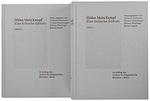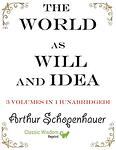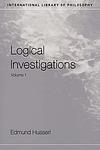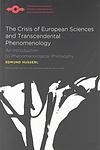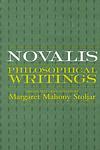The Greatest German "Nonfiction" Books of All Time
Click to learn how this list is calculated.
This list represents a comprehensive and trusted collection of the greatest books. Developed through a specialized algorithm, it brings together 284 'best of' book lists to form a definitive guide to the world's most acclaimed books. For those interested in how these books are chosen, additional details can be found on the rankings page.
Genres
Countries
Date Range
Reading Statistics
Click the button below to see how many of these books you've read!
Download
If you're interested in downloading this list as a CSV file for use in a spreadsheet application, you can easily do so by clicking the button below. Please note that to ensure a manageable file size and faster download, the CSV will include details for only the first 500 books.
Download-
1. Communist Manifesto by Karl Marx, Friedrich Engels
This influential political pamphlet advocates for the abolition of private property, the rights of the proletariat, and the eventual establishment of a classless society. The authors argue that all of history is a record of class struggle, culminating in the conflict between the bourgeoisie, who control the means of production, and the proletariat, who provide the labor. They predict that this struggle will result in a revolution, leading to a society where property and wealth are communally controlled.
-
2. Thus Spake Zarathustra by Friedrich Nietzsche
This philosophical novel explores the idea of the Übermensch, or "Overman," a superior human being who has achieved self-mastery and created personal meaning in life. The protagonist, Zarathustra, descends from his solitary life in the mountains to share his wisdom with humanity. Through a series of speeches and encounters, he challenges traditional beliefs about good, evil, truth, and religion, and advocates for the transcendence of man into a higher form of existence. The book is noted for its critique of morality, its poetic and often cryptic language, and its exploration of complex philosophical concepts.
-
3. Relativity by Albert Einstein
This book is a comprehensive introduction to the theory of relativity written by the physicist who developed the theory. It covers both the special and general theories of relativity and provides an accessible explanation of the physics involved, including the nature of light, time, and gravity. The book also discusses the philosophical implications of relativity and its impact on our understanding of reality. Written for a general audience, it aims to make complex scientific concepts understandable to non-experts.
-
4. Critique of Pure Reason by Immanuel Kant
This philosophical work delves into the nature and limits of human knowledge, proposing that while our knowledge begins with experience, it doesn't necessarily arise out of experience. The author argues that pure reason itself has the ability to contribute to our knowledge and understanding of the universe. He further explores the concept of metaphysics, asserting that while it is possible, it is also severely limited by the human mind's ability to comprehend it.
-
5. Das Kapital by Karl Marx
This influential work is a comprehensive critique of political economy, exploring the complex nature of capitalism, its production processes, and its societal impact. The book delves into the intricacies of commodities, labor theory of value, surplus value, and exploitation, arguing that capitalism is inherently unstable and prone to periodic crises. It also posits that the capitalist system ultimately leads to the concentration of wealth in fewer hands, causing social inequality and paving the way for its own demise. The book is widely regarded as a foundational text in the development of socialist and communist ideologies.
-
6. The Origins of Totalitarianism by Hannah Arendt
The book explores the roots of totalitarian systems, particularly focusing on Nazi Germany and Stalinist Russia. It delves into the historical, social, and political circumstances that led to the rise of these oppressive regimes, including anti-Semitism, imperialism, and the decline of the nation-state. The author further discusses the nature of power, the role of propaganda, and the manipulation of the masses in these systems, providing a comprehensive analysis of totalitarianism.
-
7. On the Genealogy of Morality by Friedrich Nietzsche
This philosophical work is a critical exploration of the origins and development of moral values. The author challenges conventional notions of good and evil, arguing that they evolved not from any inherent sense of justice, but rather as a means of exerting control over society. He presents a historical analysis of how morality has been used as a tool by the powerful to dominate the weak, and critiques the influence of religion and societal norms on our understanding of morality. The book is a profound examination of the nature of morality, its origins, and its impact on human behavior.
-
8. Economy and Society by Max Weber
"Economy and Society" is a comprehensive analysis of the relationship between economy and society, focusing on the role of social actions and their impact on economic systems. The book presents a theoretical framework for understanding how economic and social structures influence each other, including the role of bureaucracy, power, and authority. The author also introduces his famous concept of the "Protestant Ethic", linking the rise of capitalism to certain aspects of Christian beliefs. The book is considered a fundamental text in sociology and economics, providing a deep understanding of social and economic phenomena.
-
9. Beyond Good and Evil by Friedrich Nietzsche
"Beyond Good and Evil" is a philosophical work that challenges the moral conventions of the time, arguing that concepts of good and evil are not absolute but are instead social constructs. The book delves into the nature of individual morality, asserting that it is driven by self-interest and the will to power. It also criticizes past philosophers for their unquestioning acceptance of religious and societal norms, and promotes the idea of the "overman" or "superman", a superior human who embraces his instincts and creates his own values.
-
10. Mein Kampf by Adolf Hitler
This book is a two-volume work written by a prominent dictator during his imprisonment in 1924. It outlines his political ideology and future plans for Germany, combining elements of autobiography with an exposition of his views on race, nationality, and governance. The author's main thesis is that the German-speaking 'Aryan' race is superior to all others, and that it is the duty of the state to preserve the purity of this race through policies of racial segregation, expansionism, and extermination. The book also contains detailed discussions on the author's hatred towards Jews, Marxism, and the parliamentary system.
-
11. The Rings of Saturn by W. G. Sebald
"The Rings of Saturn" is a richly detailed travelogue that follows the narrator's journey along the coast of Suffolk, England. The narrative weaves together history, literature, and personal anecdotes, exploring topics as diverse as the decline of the herring industry, the horrors of colonialism in the Congo, and the life of philosopher Sir Thomas Browne. The book is characterized by its melancholic tone, its digressive style, and its meditative reflections on memory, time, and decay.
-
12. Being and Time by Martin Heidegger
Being and Time is a seminal work that explores the concept of "being" through a detailed analysis of human existence. The book delves into existential and phenomenological thought, examining how humans relate to the world and their own existence. The author argues that people are always "being-in-the-world" and that understanding this fundamental state is crucial to comprehending the broader concept of being. The work also introduces the concept of "Dasein," a term used to describe the specific type of being that humans possess.
-
13. Eichmann in Jerusalem: A Report on the Banality of Evil by Hannah Arendt
This book is a thought-provoking exploration of the trial of Adolf Eichmann, a major organizer of the Holocaust. The author argues that Eichmann was not a fanatical ideologue, but rather an ordinary individual who simply followed orders and bureaucratic procedures, highlighting the terrifying potential for evil in any system that values obedience over personal responsibility. The concept of the "banality of evil" is introduced, suggesting that horrific acts can be committed by ordinary people under certain conditions.
-
14. The World as Will and Idea by Arthur Schopenhauer
This philosophical work posits that the world is driven by a continually dissatisfied will, continually seeking satisfaction. The book is divided into four parts, with the first addressing the world as representation, the second detailing the world as will, the third discussing art and beauty as the only way to transcend the painful human condition, and the fourth discussing ethics and the ascetic ideal. The author argues that the will is the underlying reality of the world, beyond mere appearances, and that it is characterized by ceaseless striving and suffering.
-
15. The Emigrants by Winfried Georg Sebald
"The Emigrants" is a novel that explores the experiences and memories of four different emigrants, each with a unique and complex history. The narrative primarily focuses on the psychological impact of displacement and the haunting nature of the past. The author delves deep into their lives, revealing their struggles with identity, loss, and the persistent influence of their roots. The narrative is interwoven with historical events, photographs, and other documents, creating a rich tapestry that blurs the line between fact and fiction.
-
16. Phenomenology of Mind by G. W. F. Hegel
This profound philosophical work delves into the evolution of consciousness, examining the stages it goes through from simple sensory awareness to the complexities of ethical life and self-awareness. The author argues that the mind does not exist in isolation, but rather develops through interpersonal relationships and societal interactions. The book also presents the concept of dialectical reasoning, suggesting that truth is not static but evolves over time through a process of thesis, antithesis, and synthesis.
-
17. The Protestant Ethic and the Spirit of Capitalism by Max Weber
This book is a sociological study that explores the relationship between the ethics of ascetic Protestantism and the emergence of the spirit of modern capitalism. The author argues that the religious ideas of groups such as the Calvinists played a role in creating the capitalistic spirit. The work is noted for its rigorous methodology and its contribution to the broader understanding of the origins and development of capitalism. It has been widely influential across social sciences, especially in sociology and economics.
-
18. Essays and Aphorisms by Arthur Schopenhauer
This book is a collection of philosophical essays and aphorisms that delve into an array of topics including morality, religion, and philosophy. The author presents a pessimistic worldview, arguing that suffering is an inherent part of human existence. He discusses the nature of freedom, the importance of individuality, and the role of art and aesthetics in life. The book is known for its accessible style, making complex philosophical ideas understandable for a general audience.
-
19. Logical Investigations by Edmund Husserl
This seminal work is a foundational text in the field of phenomenology and philosophy, presenting a rigorous critique of psychologism—the view that logic is a part of psychology—and arguing for the independence and objectivity of logical truths. Through a series of detailed investigations, the author explores the nature of meaning, the structure of consciousness, and the relationship between language and logic. By distinguishing between the act of thinking and the content of thought, the work lays the groundwork for a new science of consciousness and establishes the author as a pivotal figure in 20th-century philosophy. The text is notable for its methodical approach and its significant influence on both the analytic and continental traditions in philosophy.
-
20. Decline of the West by Oswald Spengler
"Decline of the West" is a comprehensive historical and philosophical work that explores the rise and fall of civilizations. The author argues that every civilization has a life cycle, from birth to maturity and finally to decline. He suggests Western civilization is in its final stage of decline, comparing it to the end phases of the Greco-Roman civilization. The book also introduces the concept of 'pseudomorphosis', where a civilization is so deeply influenced by a previous culture that it suppresses its own authentic culture.
-
21. Storm of Steel by Ernst Jünger
"Storm of Steel" is a memoir of a German officer's experiences during World War I. The book provides a detailed account of the daily life in the trenches, the brutal and chaotic nature of warfare, and the psychological impact on the soldiers. The author describes the horrors of war with a sense of detachment, viewing the battlefield as a place where one's character is tested and shaped. Despite the grim subject matter, the memoir is often noted for its poetic language and vivid imagery.
-
22. Memoirs of My Nervous Illness by Daniel Paul Schreber
The book is a personal account of a prominent German judge's struggle with severe mental illness. It provides a detailed and vivid description of his experiences with psychosis, hallucinations, and delusions, which he attributes to divine intervention and cosmic forces. The author's attempt to understand and make sense of his condition forms the core of this memoir, and his insights have been influential in the fields of psychology and psychiatry. His narrative is a unique exploration of the mind and its relationship with reality, providing an intimate perspective on mental illness.
-
23. The Gay Science by Friedrich Nietzsche
The book in question is a philosophical work that delves into the author's ideas on morality, truth, and the nature of human existence. It is known for its poetic and aphoristic style, presenting a critique of contemporary culture and the Western intellectual tradition. The author introduces the concept of the "eternal recurrence" and famously proclaims the "death of God," challenging readers to confront the implications of a world devoid of divine authority and to embrace the potential for creating their own values. The work is a celebration of art, science, and the joyous wisdom that comes from living a life of intellectual inquiry and creative freedom.
-
24. The Crisis of European Sciences and Transcendental Phenomenology by Edmund Husserl
This book is a philosophical work that explores the crisis facing the sciences in Europe, arguing that this crisis stems from the disregard for transcendental phenomenology. The author asserts that the sciences have lost their grounding in the world of lived experience and have become too abstract and disconnected from human life, leading to a crisis of meaning. He proposes a return to the "lifeworld" and a recentering of science on human experience, using the methods of phenomenology to uncover the essential structures of consciousness and the world.
-
25. Philosophical Writings by Novalis
"Philosophical Writings" is a collection of works by a key figure in German Romantic philosophy. The book explores the author's thoughts on a wide range of subjects including art, religion, morality, nature, and the human mind. The author's poetic and imaginative style of writing is used to challenge traditional philosophical ideas and to propose a more holistic understanding of the world. The text is recognized for its deep insights and its significant influence on later philosophical and literary movements.
Reading Statistics
Click the button below to see how many of these books you've read!
Download
If you're interested in downloading this list as a CSV file for use in a spreadsheet application, you can easily do so by clicking the button below. Please note that to ensure a manageable file size and faster download, the CSV will include details for only the first 500 books.
Download








